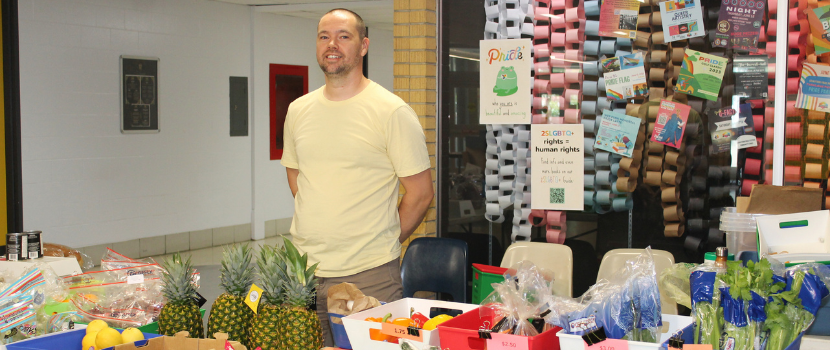SASKATCHWAN — This fall, Saskatchewan Polytechnic participated in a national survey of students called the Campus Wellbeing Survey — a study that aims to measure various aspects of student health and well-being from mental wellness and physical health to levels of support and health indicators.
Initial survey analysis by counselling and health staff in Student Services reveals that food security is a significant issue for many Sask Polytech students, and one that is growing.
Though this information is not unexpected given the current food pricing climate, having data to contextualize the issues is important. “We can’t help to solve a problem if we don’t have a good idea of what the problem is,” says Alasdair Morrison, Sask Polytech’s sustainability research facilitator. “For that reason, we’re going one step further to find out more than what the Campus Wellbeing Survey tells us.”
Morrison is leading a research project funded internally by Sask Polytech’s Academic Innovation Fund to learn more about the issue among Sask Polytech students. He anticipates that a food-security-specific survey will help him to tease out further details including differences from campus to campus and demographic variables.
In addition to gathering and analyzing data, Morrison hopes to compile a list of current, food-related initiatives aimed at supporting students. “We know various units within Sask Polytech are running food-security initiatives,” he says, “but these are often done off the side of their desk. An inventory of what’s currently being done will help us coordinate between groups and may lead to more formal supports and services in this area.”
Student Services is supporting Morrison’s research alongside the Office of Applied Research and Innovation. Kendra Strong-Garcia, Sask Polytech’s director of Student Experience and Learning Services, notes that food security is an important issue because it has the potential to impact student learning and ultimately, student outcomes. “When students face food security challenges,” says Strong-Garcia, “they may have to prioritize working or leave their studies altogether to make sure there is food on the table, either for themselves or for their families. Lack of access to an adequate supply of healthy food can become a major disruption that interferes with their ability to learn.”
“Much of what is currently being done could be classified as crisis response,” says Morrison. The Saskatchewan Polytechnic Students Association (SPSA), for example, works with food banks in Prince Albert, Regina and Saskatoon to obtain food hampers for students in need. The SPSA also runs its SAvivor program, which offers students one breakfast and one supper per month to get students in need through until they can purchase groceries or receive a food bank hamper. Student-specific units such as Indigenous Student Experience provide Indigenous holiday hampers to students who need them in December. “We’re hoping to move beyond these types of emergency supports to more proactive, sustainable solutions that will help students to become food secure,” explains Morrison.
An example is a partnership Morrison and his Colleges and Institutes Canada (CICan) intern, Kelsey Morris, are currently cultivating with community organization CHEP and their Good Food Box program. Plans are underway to set up an affordable fresh fruits and veggies depot at Saskatoon main campus for students without easy access to transportation to grocery stores. “We’ve been trying out this idea on campus over the past year,” says Morris, a Sask Polytech graduate from the Medical Laboratory Assistant program currently in the Indigenous Leadership Skills program through Les Femmes Michif Otipemisiwak.
Another initiative undertaken by the Indigenous Student Experience team is a partnership with the Saskatoon Food Bank. Monthly cooking classes over the lunch period are offered to all students in the Indigenous student centre. Participants learn about healthy, inexpensive meals they can prepare at home and share a free lunch while learning. Students are encouraged to take part and help spread the word.
Food Services is interested in helping to become part of the solution and has been part of a working group set up by Morrison. Says Bobbi Bates, manager of retail food services, “We have been looking at ways we can assist with food security initiatives, such as storage for the CHEP markets. Alasdair and others have great ideas that are worth exploring. It may be possible to assist in the future with things such as bulk purchasing.” All four campuses offer daily specials and options for quick and easy single meals to students at The Commons—Sask Polytech’s cafeteria. Food costs, Bates notes, are on the rise everywhere, and that makes offering inexpensive meals to students a challenge. “We’re service focused and have committed to a cost-recovery model” says Bates. “We’re not here to make a profit from our students.”
Sask Polytech’s international team is also interested in learning more about how the issue affects international students, specifically. Says Annie Luyao Fu, director for International, “We believe that by collecting data we can gain a deeper understanding of the challenges. We are glad that this issue is being studied and are happy to explore further to find collaborative ways to support our students.”
“We encourage all areas across Sask Polytech with formal or informal programs or initiatives aimed at helping students with food security to reach out so we know about the work you are doing,” says Morrison. “And, of course, students are encouraged to take part in our survey. With more information we will be better positioned as an institution, and a community, to tackle this important sustainability challenge.”
To participate in the Sask Polytech Student Food Insecurity survey, students are asked to check their email or log in to mysaskpolytech.ca where they will find a survey link under announcements.
— Submitted by Saskatchewan Polytechnique Media Relations
SASKTODAY.ca is Saskatchewan's home page. Bookmark us at this link.




